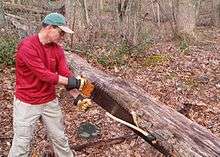Underbucking

Underbucking is a type of log bucking cutting upwards from the bottom of a suspended log as opposed to overbucking which is cutting from the top down.[1]
Overview
An underbucking tool can be made using an ax driven into the side of the log so that a crosscut saw can be turned upside down. Underbucking is called that because a sawyer will cut the suspended log from the underside of the log, upwards. Cutting from the top of a suspended log will cause the log to bind on the saw blade as the log sags at the cutting point. Cutting from below will cause the cut to widen as the log sags, avoiding binding on the saw blade.
Tool description
A special tool designed specifically for underbucking makes the job of cutting from the ground upwards a lot easier. The underbuck tool is driven into the section of the log which is considered to be least likely of moving once the cut has been successfully made. The crosscut saw's backside rides along the pulley that rests on the bar driven into the log. As the sawyer draws the saw backward, the sawyer may apply leverage downward and the pulley will redirect the force upward into the wood. Sometimes a sawyer will not want to do underbucking. They will either sometimes just cut from the top down, or they will half underbuck and then just finish by cutting it from the top.[2]
References
- ↑ Self, Charles R.. Wood heating handbook. Blue Ridge Summit, Pa.: G/L Tab Books, 1977. 220. Print.
- ↑ "Saws that Sing: A Guide to Using Crosscut Saws". US Department of Transportation. Retrieved 19 March 2012.
External links
- Short video of axe being used as an underbuck. The flexibility of the axe handle makes this a preferred method of single underbucking.
- Image of an underbucking tool with a roller
Sources
- http://www.enotes.com/topic/Underbucking
- Miller, Warren. Crosscut Saw Manual. USDA Forest Service, 1978, published by the U.S. Government Printing Office. Revised edition December 2003. See page 23 for underbucking example.
- Michael, David E. Saws That Sing, A Guide To Using Crosscut Saws. USDA Forest Service, December 2004, published by the U.S. Government Printing Office 64 pages.